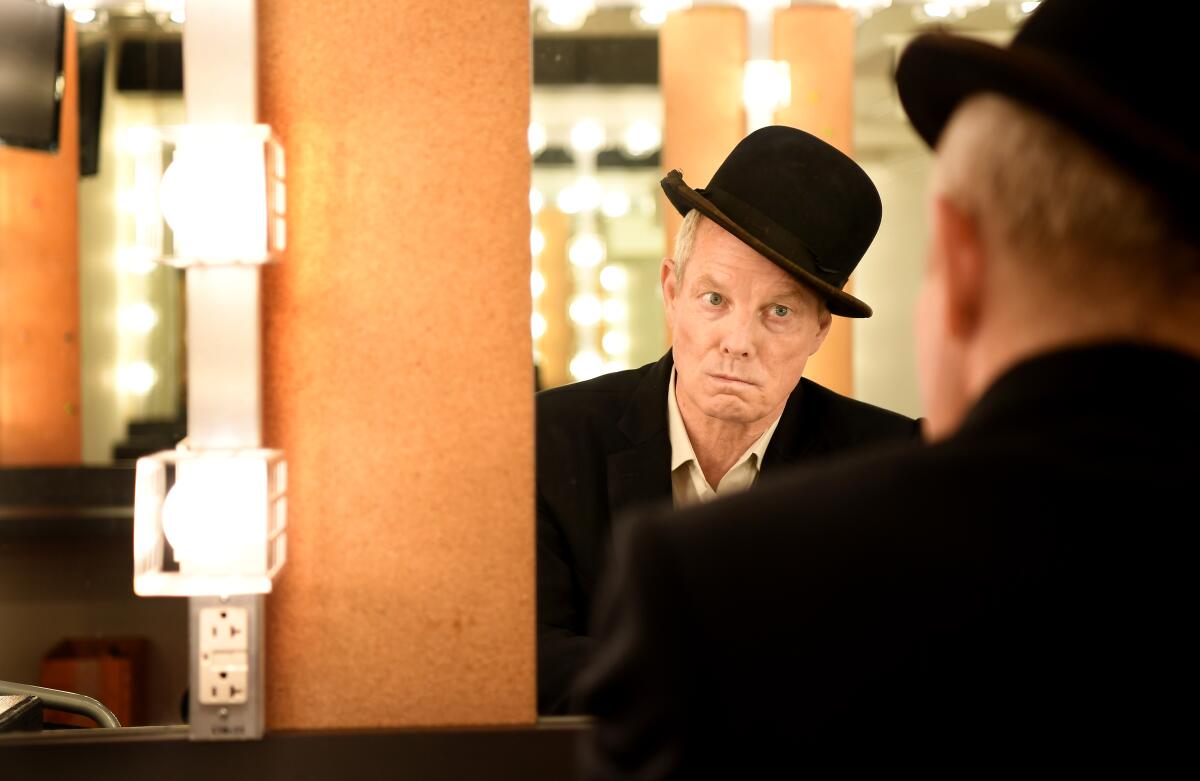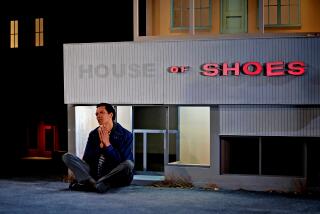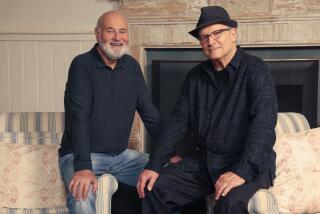For Bill Irwin, master interpreter of Samuel Beckett, even the unspoken word matters

Samuel Beckett is widely revered as the master playwright of the theater of the absurd, as well as a fearless chronicler of the human condition. Bill Irwin adds another accolade: Author of some of the best stage directions ever.
“Take this one from ‘Waiting for Godot’: ‘They stand motionless, arms dangling, heads sunk, sagging at the knees,’” the veteran performer said with childlike enthusiasm.
Indeed, the sentence is quintessential Beckett: Highly specific, and yet ambiguous in terms of its effect. It’s up to the performer, and the audience, as to whether the resulting stage image is depressing, amusing or both.
Irwin is an acclaimed dramatic actor (he won a Tony Award for “Who’s Afraid of Virginia Woolf?” — a role he reprised at the Ahmanson Theatre in 2007) and an astonishingly agile physical comedian. Irwin has been haunted by Beckett’s writing for most of his adult life. Over the years, he has performed in two high-profile New York productions of “Godot” — one featuring Steve Martin and Robin Williams, and another opposite Nathan Lane.
Nearing his 70th birthday, Irwin has channeled his obsession into the show “On Beckett,” which began previews Friday and opens Wednesday at the Kirk Douglas Theatre in Culver City. “It grew out of a nagging impulse,” he said. “I analogize it to a pearl — an irritant that becomes a beautiful gem — although I won’t make that claim for it!”
No need; others have remarked on its illuminating polish. The New York Times called it “a reminder of a crucial paradox of great art, in which precise craft becomes a vehicle for profound mystery.” Lane put it more simply: “He’s so brilliant in the show. His fascination with Beckett is infectious.”
That intense interest was piqued just a few miles from the venue he’ll be performing in — at UCLA, where the Santa Monica native began his college education. (He went on to CalArts, which he attended the year it opened, and ultimately Oberlin College, where he earned his degree in theater.) He recalls coming across Beckett’s “Act Without Words” in a literary anthology — a dialogue-free one-act play that consists entirely of stage directions.
At CalArts, he had the good fortune of studying with Ruby Cohn, who was a friend of Beckett’s and a scholar of his work. In those days, Irwin said ruefully, his attitude toward the playwright’s work was one of youthful arrogance.
“I remember looking at ‘Godot’ and thinking, ‘You could save this,’” he recalled.
His attitude had shifted enormously by the 1980s, when director Joseph Chaikin, another Beckett collaborator, invited him to perform the prose pieces “Texts for Nothing.” “Ever since then, I have not been able to get that language out of my head,” Irwin said. “Other things I memorize are gone as soon as I don’t need them anymore. This stuff has stayed with me to an amazing degree.
“I asked myself, ‘Why is that?’ Well, theater people have a coping mechanism. We take something we’re trying to work through and make a theater piece out of it.”
That process began roughly three years ago, when Irwin brought the idea to Carey Perloff, then the longtime artistic director of San Francisco’s American Conservatory Theatre. “She gave me a space to work in, and some students to work with,” he said. He premiered the show in San Francisco in 2017 but continued to refine it in subsequent stagings, including an off-Broadway run in 2018. It reached its more or less final form — he is still tinkering with certain sections — at the Irish Repertory Theatre in New York last year.
“It’s as much about Bill as it is about Beckett,” Lane said.
Indeed, between readings from the plays and various prose works — and inevitable forays into baggy-pants comedy — Irwin discusses his journey through the writing, delving into the intricacies of Beckett’s language, which somehow manages to be simultaneously precise and ambiguous. “It’s a very particular voice,” he said. “His pronouns are very slippery.”
Irwin finds Beckett’s remarkable use of language something of a balm at a time when the use of words has grown so imprecise. “Our culture runs away from words,” he bemoaned. “It seems to me one of the things this language can do is help us reconnect with human intelligence, as distinct from artificial intelligence. A lot of Beckett’s language is a portrait of consciousness — of how the mind works.”
Irwin met Beckett once, in 1988, and feels he squandered that encounter.
“He was so shy, and I was so shy, we both looked at the Formica table more than each other,” Irwin said. “If I knew then what I know now, I would have asked him so many questions!”
Instead, they remained in his brain, ultimately taking the shape of a one-man show. “In part, that’s what ‘On Beckett’ is,” he said. “A do-over.”
'On Beckett'
Where: Kirk Douglas Theatre, 9820 Washington Blvd., Culver City
When: 8 p.m. Tuesdays-Fridays, 2 and 8 p.m. Saturdays, 1 and 6:30 p.m. Sundays, through Oct. 27
Tickets: $30-$75 (subject to change)
Info: (213) 628-2772, www.CenterTheatreGroup.org
More to Read
The biggest entertainment stories
Get our big stories about Hollywood, film, television, music, arts, culture and more right in your inbox as soon as they publish.
You may occasionally receive promotional content from the Los Angeles Times.











